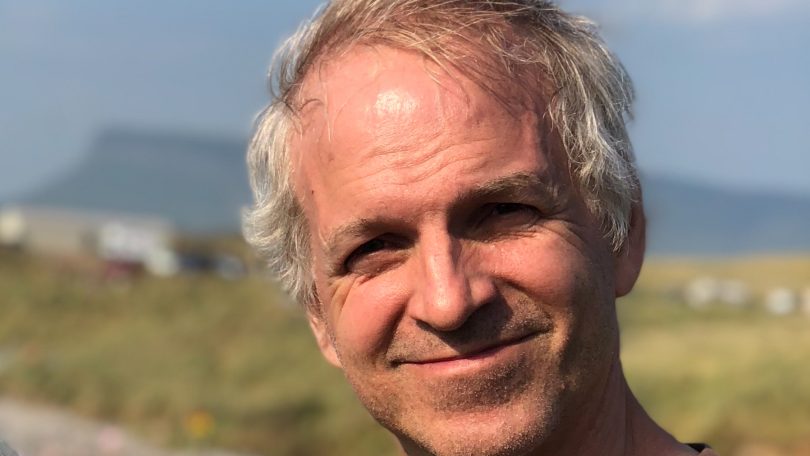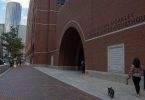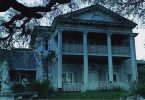By Susannah Sudborough
BU News Service
On August 18, Emerson College announced that a film professor, Robert Todd, had passed away.
According to multiple alumni, rumors that his cause of death was a suicide spread, as his family made allusions to the nature of his death on his Facebook page and announced their participation in a walk to support suicide prevention in conjunction with his death. Todd’s family told BU News Service that they believe his death to be a suicide.
Two weeks after Todd was found dead, Emerson publicly revealed that he had been subject to a months-long Title IX investigation for sexual harassment.
In remarks to the Faculty Institute on Sept. 4, Emerson’s President Lee Pelton specified that Todd had been found guilty of sexual harassment under the college’s Sexual Misconduct Policy. Because of this, he had been suspended without pay for the Fall 2018 semester and was required to see a counselor to prevent further incidents and understand the impact of his actions.
Pelton also said that Emerson released information about the disciplinary actions taken against Todd because “misleading and false” information had disseminated among the Emerson community. He said that in releasing the information, he intended to be transparent and dispel rumors.
Yet, students, alumni and others trying to contextualize the situation have complained that Emerson released too little information, and that it begs more questions than it answered. According to students and alumni, since releasing the news about Todd’s Title IX investigation, Emerson has been noticeably quiet about what is an upsetting and important issue for them and other community members.
Boston University News Service has spoken to both former students of Todd and his family over the course of two months.
In interviews with BU News Service, alumni said they did not find out about Todd’s death or his Title IX violation through Emerson, but found out second or third hand through friends who had heard the news, or from posts on social media.
According to multiple current students and alumni, no meetings or information sessions have been held for students on campus. There has been no opportunity for anyone to ask questions of the college or anyone involved and there has been no opportunity for students to share and talk about their feelings about what has happened.
Apart from a Facebook post on the Emerson alumni page that sparked heated debates over whether Todd should be remembered fondly or in disgrace, conversations about Todd and what the allegations against him mean are only occurring privately among former students and friends.
What does the public know?
In the remarks made to the Faculty Institute, President Pelton laid out this timeline:
In December 2017, an Emerson staff member made a complaint to the college that Todd had engaged in “multiple, concatenated behaviors” that may have violated the college’s Sexual Misconduct Policy.
The Title IX Office brought in an outside investigator who looked into the case for many months.
Based on what the investigator found, the college found Todd guilty of sexual harassment under their Sexual Misconduct Policy.
As a punishment, Todd was suspended without pay for the Fall 2018 semester and was required to see a counselor to “help him understand the impact of his behaviors, as well as ensure that they would not happen in the future.”
The remarks specify that Todd would have been able to appeal the decision.
Pelton also mentioned that during the Title IX investigation, the chair of the Visual Media Arts Department and the Title IX Office received “additional third-party reports” of other incidents where Todd might have violated the college’s Sexual Misconduct policy. But, upon investigation, the college deemed that there was “insufficient evidence” to prove further Title IX violations.
Todd was last seen entering Franklin Park in Jamaica Plain on Aug. 16. He was reported missing later that day.
On Aug. 18, Todd was found dead in the park.
On Sept. 4, Pelton spoke to the Faculty Institute about Todd’s Title IX investigation and its findings, to address rumors surrounding Todd’s death.
Who was Robert Todd?
According to members of his family, Todd was an experimental filmmaker, well-known and respected among the experimental film community.
He was known for both abstract films, such as “Gems,” and documentary films, such as “In Loving Memory: Testimonials of Death Row Inmates Regarding Life.”
His films were featured in film festivals around the country and the world.
“Rob was first and foremost an artist,” said Paul Lazo, a former student of Todd’s.
Todd was not a new or lesser-known member of the Emerson Community. He had been teaching at Emerson for 18 years and was a core part of the college’s renowned film program.
“He was THE film guy,” said Jim Dandee, a former professor in the Emerson Visual Media Arts department. “He had a lot of sway in the program.”
Todd was also very well liked. Many alumni and current students have expressed deep feelings of affection toward Todd over social media and in interviews. Many also described him as an influential mentor for film students, especially those who did not fit within the cultural and artistic norms at Emerson.
In interviews with former students, a consistent refrain arises when it comes to describing Todd: he was weird, quirky, open, sensitive, approachable, caring, and generous with his time.
Former students describe him as someone you could talk to about anything, be it a question about experimental film techniques or a complicated philosophical question. They say he was someone whose art and teaching touched people deeply in a positive and formative way.
Several former students of Todd’s recounted that he had been an incredible resource and comfort when they were facing difficult experiences in college. Others said he was one of the best teachers they had ever had.
The positive emotions students held for their teacher are reflected in his feedback to his students. Shari Gaynes, Todd’s former student, shared an excerpt from an email Todd sent to her about her final project:
“The warmth is so palpable that I felt embraced by you, a lovely transference from you to the audience, brought to a sobering sense by your ruminations on the force of love and time,” the email reads.
Todd’s passing and Title IX violation affecting the Emerson community
When news spread of Todd’s passing, the public outpouring of grief at his loss was covered by many news organizations, including WBUR, Boston.com and Dig Boston.
Many people, from former film contemporaries to former and current students, posted on social media to express their sadness.
Everything changed when the allegations of sexual harassment were made public.
According to friends, colleagues and former students of Todd’s, no one suspected that he would be accused, let alone found guilty of sexual harassment.
If anything, they say that it seems entirely counter to the person they knew: a man who was often a haven for misfits and marginalized people at Emerson.
Which makes Todd’s passing and subsequent revelations about sexual harassment allegations all the more difficult for those who knew and loved him.
Former students have overwhelmingly expressed confusion about trying to reconcile their view of and feelings about a person they held so dear, given this new information.
“It’s traumatic to have to make assumptions based on nothing,” said Eric Moore, a former student of Todd’s. “It’s traumatic to hear about a person you cared about doing these horrible things.”
Other former students, such as Gaynes and Jonathan Ade, also find it difficult to reconcile the allegations and their picture of Todd.
“I don’t know if I should think of him as a good professor or let go of all thoughts of him,” said Gaynes.
“I can’t help but reframe my view of him,” said Ade. “But I’m no closer to closure.”
Many former students have said they wished their former mentor was still around to address and give context to what they have learned about him.
“Nothing can be resolved because we can’t hear from him,” said Gaynes. “It feels like we can’t draw conclusions because he never made a statement. We’re wondering questions that don’t have answers.”
Ade wondered if Todd had been devastated by the suspension because he was primarily able to produce his films using Emerson’s resources and thus would have been cut off from his art.
“After finding out about the sexual harassment, it’s likely people at Emerson would have rejected him, and it would have been hard,” said Gaynes.
Megan Hess, also a former student of Todd’s, said that he likely felt betrayed by the institution he devoted almost two decades to.
Emerson’s response
In a statement to BU News Service, Emerson spokesperson Sofiya Cabalquinto said: “Professor Todd was a faculty member for over 18 years, and our sympathies are with Rob’s family and all those who knew and cared for him. These are not easy circumstances, but we have tried to handle this as best we can with compassion and respect for all those who have been affected.”
Remarks to Faculty Institute Emerson College (Text)
Yet, alumni and students interviewed by BU News Service maintain that Emerson College officials have offered little in the way of resources to help the community handle their grief and confusion.
Apart from suggesting community members reach out to spiritual leaders at Emerson when President Pelton initially announced Todd’s death, and reminding students that they could use Emerson’s counseling services in an email informing the community of the family’s planned memorial, Emerson has not engaged the larger Emerson community during the healing process.
Hess said that she had wanted to take advantage of any grief counselors or other resources Emerson might be offering alumni.
“I thought I could really use that resource because it was all so upsetting,” said Hess. “But I couldn’t find any way to contact them. I couldn’t find any number to call. Nothing.”
Other alumni wished that Emerson had allowed community members to air their thoughts and feelings with each other to work through what had happened together.
Many former students of Todd’s said that they wished Emerson had been more present in the discussions surrounding Todd’s death and the Title IX violation.
“Emerson did nothing to join the conversation with students and alumni,” said Moore. “Emerson needs to be more open and proactive so that people aren’t hearing this information from third parties.”
“I wish Emerson had been more upfront about everything instead of pretending things were normal,” said Charles Pieper, a former student of Todd’s.
“Emerson acted like a corporation with their best interests in mind,” said Hess.
Still, some former students also wondered if a satisfactory way to handle the situation even existed.
Former students of Todd’s overwhelmingly felt that in general, Emerson improperly handles sensitive situations such as this and is ill-prepared to engage with the community on this issues.
Todd’s sister, Deb Todd Wheeler, speaking on behalf of the family, said they tried to engage with Emerson about the handling and publicizing of his death, but she feels they were treated poorly.
“We came away from those conversations outraged to learn only that we are not alone in suffering from confusion, and that true leadership at Emerson is lacking,” Wheeler wrote in a statement to BU News Service.
“From our point of view, whatever unresolved conflict may have remained in Robert’s life, it should never have taken precedence over the grieving of those who loved him and depended on him,” she said.
In the past five years, Emerson College has been sued twice for allegedly mishandling Title IX investigations.
Though both cases were decided in a summary judgment in favor of the school, it is notable that in one of them, Emerson’s lawyer’s argued that Emerson had no legal duty to protect students from rape and sexual assault.
In 2014, the Huffington Post reported that one of Emerson’s lawyers argued: “Absent unusual circumstances, there is no duty for a school to protect others from the criminal or wrongful acts of third persons.”
“Emerson is just like their dorm, the Little Building,” said Pieper. “It looks great from the outside, it has an amazing reputation. But on the inside, everything is falling apart.”
Authorities at Emerson College declined to comment.
Regardless of whether they believed Todd was guilty of the Title IX violation, former students overwhelmingly said that they were deeply concerned about the well-being of both Todd’s family and whoever made the Title IX complaint and hoped that they are receiving all the support they need.
Despite Emerson’s lack of involvement in the community’s healing process, alumni are coming together to support each other. Many said they had reached out to other students who had been in Todd’s classes with them and found comfort in knowing they were experiencing similar emotions.
In conversations among themselves, members of the Emerson community have offered to each other what little insight on the situation they can.
“These are people we know and love,” said Moore. “And people are fallible and capable of unforgivable things.”
“I understand why this is surprising to so many people, but it’s not unfathomable to me,” said Dandee. “As a teacher, you bring your best self to the classroom. You don’t bring your darkness.”
Even so, many of those who loved Robert Todd are still struggling.
“I may never get any answers,” said Ade. “And I may have to live with this disjointed image of a person I loved.”





